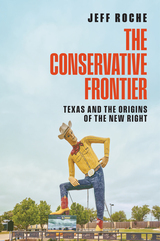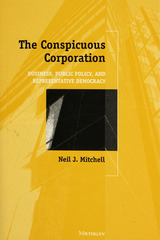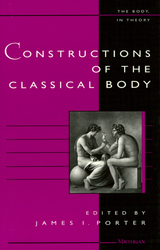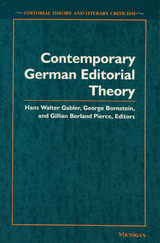3 books about Frey, Mattias
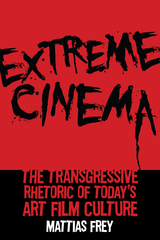
Extreme Cinema
The Transgressive Rhetoric of Today's Art Film Culture
Frey, Mattias
Rutgers University Press, 2016
Honorable mention, 2017 Best Monograph Award from the British Association of Film, Television and Screen Studies (BAFTSS)
From Shortbus to Shame and from Oldboy to Irreversible, film festival premieres regularly make international headlines for their shockingly graphic depictions of sex and violence. Film critics and scholars alike often regard these movies as the work of visionary auteurs, hailing directors like Michael Haneke and Lars von Trier as heirs to a tradition of transgressive art. In this provocative new book, Mattias Frey offers a very different perspective on these films, exposing how they are also calculated products, designed to achieve global notoriety in a competitive marketplace.
From Shortbus to Shame and from Oldboy to Irreversible, film festival premieres regularly make international headlines for their shockingly graphic depictions of sex and violence. Film critics and scholars alike often regard these movies as the work of visionary auteurs, hailing directors like Michael Haneke and Lars von Trier as heirs to a tradition of transgressive art. In this provocative new book, Mattias Frey offers a very different perspective on these films, exposing how they are also calculated products, designed to achieve global notoriety in a competitive marketplace.
Paying close attention to the discourses employed by film critics, distributors, and filmmakers themselves, Extreme Cinema examines the various tightropes that must be walked when selling transgressive art films to discerning audiences, distinguishing them from generic horror, pornography, and Hollywood product while simultaneously hyping their salacious content. Deftly tracing the links between the local and the global, Frey also shows how the directors and distributors of extreme art house fare from both Europe and East Asia have significant incentives to exaggerate the exotic elements that would differentiate them from Anglo-American product.
Extreme Cinema also includes original interviews with the programmers of several leading international film festivals and with niche distributors and exhibitors, giving readers a revealing look at how these institutions enjoy a symbiotic relationship with the “taboo-breakers” of art house cinema. Frey also demonstrates how these apparently transgressive films actually operate within a strict set of codes and conventions, carefully calibrated to perpetuate a media industry that fuels itself on provocation.
[more]
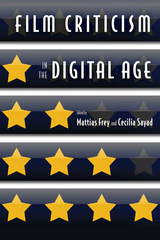
Film Criticism in the Digital Age
Frey, Mattias
Rutgers University Press, 2015
Over the past decade, as digital media has expanded and print outlets have declined, pundits have bemoaned a “crisis of criticism” and mourned the “death of the critic.” Now that well-paying jobs in film criticism have largely evaporated, while blogs, message boards, and social media have given new meaning to the saying that “everyone’s a critic,” urgent questions have emerged about the status and purpose of film criticism in the twenty-first century.
In Film Criticism in the Digital Age, ten scholars from across the globe come together to consider whether we are witnessing the extinction of serious film criticism or seeing the start of its rebirth in a new form. Drawing from a wide variety of case studies and methodological perspectives, the book’s contributors find many signs of the film critic’s declining clout, but they also locate surprising examples of how critics—whether moonlighting bloggers or salaried writers—have been able to intervene in current popular discourse about arts and culture.
In addition to collecting a plethora of scholarly perspectives, Film Criticism in the Digital Age includes statements from key bloggers and print critics, like Armond White and Nick James. Neither an uncritical celebration of digital culture nor a jeremiad against it, this anthology offers a comprehensive look at the challenges and possibilities that the Internet brings to the evaluation, promotion, and explanation of artistic works.
[more]
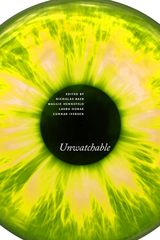
Unwatchable
Baer, Nicholas
Rutgers University Press, 2019
We all have images that we find unwatchable, whether for ethical, political, or sensory and affective reasons. From news coverage of terror attacks to viral videos of police brutality, and from graphic horror films to transgressive artworks, many of the images in our media culture might strike us as unsuitable for viewing. Yet what does it mean to proclaim something “unwatchable”: disturbing, revolting, poor, tedious, or literally inaccessible?
With over 50 original essays by leading scholars, artists, critics, and curators, this is the first book to trace the “unwatchable” across our contemporary media environment, in which viewers encounter difficult content on various screens and platforms. Appealing to a broad academic and general readership, the volume offers multidisciplinary approaches to the vast array of troubling images that circulate in global visual culture.
With over 50 original essays by leading scholars, artists, critics, and curators, this is the first book to trace the “unwatchable” across our contemporary media environment, in which viewers encounter difficult content on various screens and platforms. Appealing to a broad academic and general readership, the volume offers multidisciplinary approaches to the vast array of troubling images that circulate in global visual culture.
[more]
READERS
Browse our collection.
PUBLISHERS
See BiblioVault's publisher services.
STUDENT SERVICES
Files for college accessibility offices.
UChicago Accessibility Resources
home | accessibility | search | about | contact us
BiblioVault ® 2001 - 2025
The University of Chicago Press


